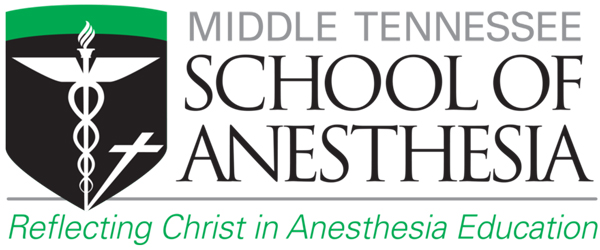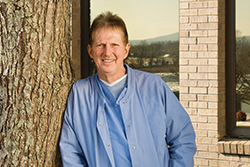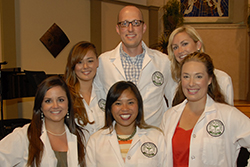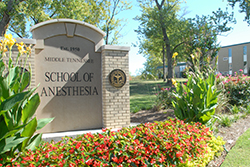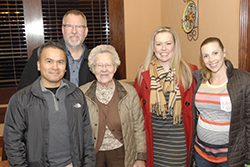Airways
October – December 2019
MTSA Fellow Publishes Case Studies from Army Deployment in Syria
Photo caption: MTSA Acute Surgical Pain Management Fellow and U.S. Army Major Robert Fabich, DNP, CRNA, was deployed in 2018, providing anesthesia care on the battlefront in Syria.
While deployed in Syria for 10 months during 2018-19, U.S. Army Major Robert Fabich, DNP, CRNA, saw more than 500 traumas and provided anesthesia care for 130 surgeries. During that time, he relied on his training from MTSA’s Acute Surgical Pain Management (ASPM) Fellowship to ensure his patients—both coalition troops as well as local nationals—received the best care possible in one of the most challenging settings imaginable.
Fabich leveraged his war-zone experience and developed two case studies, with the help of several colleagues, that have been recently published in Military Medicine:
- A Novel Use of the Erector Spinae Block in the Austere Environment (co-authors: Sharrod Greene, DNP, CRNA; Currie Tighe, BSN, RN; Rebekah Devasahayam, MD; and Tyson Becker, MD, FACS)
- Definitive Management of a Traumatic Airway: Case Report (co-authors: Benjamin T. Franklin, MD, and Nicholas Langan, MD)
“What’s unique about these cases is that the CRNA may be the only anesthesia provider in the room. There’s no backup,” Fabich said. “It’s a big responsibility because you’re doing a lot of major cases—open heart, vascular, abdominal—and all those emergency skills that you may have only talked or read about you may now have to do in a battle zone. So you have to be confident in your education and training.”
Fabich was part of an 11-member forward surgical team stationed in “Green Village,” supporting the troops on their final push against ISIS strongholds in Syria. Set up in an abandoned school house, the group started with only a couple stretchers and basic equipment. During their 10-month deployment, they converted the space into a makeshift hospital. The building didn’t always have electrical power and was not completely sealed off from the outside environment and weather.
“One of the issues we kept facing was that we needed to send our surgical patients with non-medically trained personnel for an ambulance ride to a local hospital for continuation of care. So we started brainstorming ideas for ways we could get them comfortable or in a position, which included being able to support their own airways, without a lot of narcotic so they would be safe along the way,” Fabich said.
Cases Published in Military Medicine
The case described in the Definitive Management of a Traumatic Airway involved the successful emergency management of a traumatized airway from a severe maxillofacial and neck-penetrating gunshot wound. The team consisted of two general surgeons, CRNA (Fabich), emergency room RN, two operating room technologists, two advanced trauma medics, and two intensive care LPNs. The case report focused on the importance of preparation, good communication, teamwork, and a strong knowledge base while working in the austere setting.
The focus of the Erector Spinae Block article was the case of a 25 year-old male with penetrating chest trauma. Due to limited resources and minimal monitoring in-transit, a regional anesthetic was placed for pain control. According to Fabich’s report, it is the first description of an erector spinae block utilized in a far forward combat setting.
Fabich said the experience helped him appreciate the utilization of newly acquired skills: “I learned how to do an erector spinae block during MTSA’s ASPM Fellowship. I thought to myself, ‘I think we can use this, which would enable us to not use narcotics.’ What it showed me is you need to be able to try new things safely and use what you’ve learned to the benefit of the patient.”
“Robert’s enrollment in the Fellowship was actually interrupted by his deployment to Syria,” said Bill Johnson, DNAP, CRNA, director of the ASPM Fellowship. “He used what he learned and put it to practical use in the field. He has been on the front lines providing life-saving care to injured troops as well as those less fortunate caught between battle lines. We’re glad he is able to come back and complete the Fellowship with this valuable experience under his belt.”
Hands-on Learning at MTSA
Commenting on the hands-on regional cadaveric workshops utilizing ultrasound, which is part of the Fellowship curriculum, Fabich said: “The labs were amazing. MTSA’s program goes beyond the basics, allowing us to think of other ways to approach cases, such as multimodal approaches to pain control and how to bring it into your practice. In terms of ultrasound, it’s probably one of the best cadaveric labs I’ve been to, especially with the pulsatile models.
“Through all these experiences, I’ve learned you always need to be ready to use that full skill set of anesthesia. You have to keep current and fresh. You can’t throw it on the back burner, because you never know when you’re going to use it again,” Fabich added.
Prior to joining the Army, Fabich received his BSN from Norwich University, attended the Army’s graduate program in anesthesia nursing, and earned his DNP from Northeastern University. A native of Bedford, N.H., he is married to Rebecca and currently serves as chief of the anesthesia department at Fort Wainwright in Fairbanks, Alaska.
Following are additional excerpts from our conversation with Robert Fabich:
Airways: What was a “typical day” during your deployment on the forward surgical team in Syria?
Robert Fabich: It would be difficult to describe a typical day because there was no such thing. But essentially you’d wake up in the morning—whether at 3 a.m. or 8 a.m., you never knew—to someone pounding on the door yelling, “Patient!” They’d come in and you go from 0 to 100 instantaneously, with these massive traumas. You bring them into the OR, then ship them out, then you clean up and hope you get 5 or 10 minutes to eat because there was no communication about when the next patient is coming. You’re always on edge, waiting. At the same time, there’s an active war going on, with missiles being fired right next to where we were trying to do surgery.
Airways: How did you manage in an environment where you didn’t have some of the basic supplies or equipment for the tasks at hand?
R.F.: From an anesthesia perspective, we would ask, “Can I get by with not using this medicine on this patient? I would normally administer it, but can I still do a safe anesthetic without it?” If the answer was “yes,” we might give half of the medicine we normally would give because I know I might need the other half for someone else. It’s definitely a situation where you have to improvise. You’re in the middle of a war zone. There’s no option for just ordering something on Amazon.
Airways: Any other cases that stand out in your memory?
R.F.: As our partner forces started gaining ground, we started to see more humanitarian cases – people who had been stuck in certain places and weren’t able to get out. So we started seeing more children and mothers. In one case, a woman came through the door, and we delivered her baby in that very moment. A lot of the kids started coming in and you just hopefully give a positive impact on a child’s life so maybe they remember that not everyone is bad in the world. That was always a good feeling when we could take care of them.
Airways: How did you choose to become a CRNA, and what does it mean to you to be practicing in the armed forces?
R.F.: I had a friend who was an ICU nurse and CRNA. He suggested I look into being a CRNA. So I shadowed him and thought it was really something I would like. It was a good mixture of critical thinking, making my decisions and doing a lot of procedures.
I feel like my role in the Army is a supporting role in a bigger picture. I take care of soldiers, providing the anesthetic so the surgeon can do surgery and that soldier can get back to doing their job, which in turn helps the country. On the back side of that, we also get to take care of our veterans and retirees, who have given so much for us.
For more information on MTSA’s Acute Surgical Pain Management Fellowship, visit www.mtsa.edu/fellowship.
President’s Message: Professional Development Grants
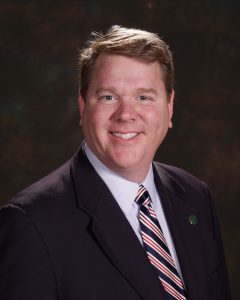
Chris Hulin
DNP, MBA, CRNA
President
MTSA is taking bold new steps to propel nurse anesthesia forward. I’m thrilled that members of our Board of Trustees, along with our Alumni Committee, are launching a framework for professional development grants to grow the body of knowledge in our field.
The new program—a first for MTSA—provides funding for CRNAs who want to continue their education and contribute to research that will help advance nurse anesthesia in practical ways. Demonstrating MTSA’s commitment to this effort, the Board has designated a portion of investment income to launch the program.
I’m excited to see the many ways CRNAs will be able to develop research, best practices and case studies that elevate the collective knowledge of our clinical community. The work will be centered within our Acute Pain Institute, which will serve as a consortium of skilled practitioners from across the globe whose goal is to enhance our profession’s relevancy and scope.
This effort is central to MTSA’s mission. It’s our first foray into grant funding for continuing education, and the focus is on making it more affordable for our alumni to reach higher levels of competency while contributing to broader impacts in our discipline. We recognize that completing a doctorate degree or logging continuing education does not necessarily generate additional income on its own, which is why we want to help offset the costs so that more of our alumni can participate and engage with MTSA to meet lifelong learning goals.
I’d like to specifically recognize Matt O’Connor for having the vision and advocating for this during his tenure as a board member and alumni president; along with current Alumni President Rod Schwindt and Alumni Subcommittee Chair Samantha Porter for carrying it forward. I’m grateful to the board for their endorsement and support of this program, and I look forward to seeing how it bears fruit for everyone involved!
More information on the Professional Development Grant Program can be found in this issue of Airways.
Guyanese Students Visit MTSA Campus
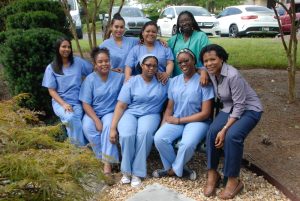
MTSA welcomed Guyanese student nurse anesthetists (pictured in scrubs) for a week of workshops and classes. They were accompanied by Alexandra Harvey (right), MD, Program Director, Anesthesia Training, and Director of Medical Education at Georgetown Public Hospital Corp.
In August, MTSA welcomed seven Guyanese students enrolled in the nurse anesthesia program at Georgetown Public Hospital Corporation (GPHC) for a unique campus visit. MTSA’s connection with the program stems from several mission trips led by MTSA faculty and administration over the past two years.
The students were accompanied by Alexandra Harvey, MD, Program Director, Anesthesia Training, and Director of Medical Education at GPHC. She and the students participated in classes and a regional cadaveric workshop as well as received a tour of Nashville.
“This visit has really opened the students’ minds and vision of what is possible for them in the field of nurse anesthesia,” Harvey said. “Having this relationship with MTSA allows the students to connect with people who are doing this type of work daily. It improves their morale, and they see that they’re part of a larger community of CRNAs, which we have in Guyana but not nearly on this scale.”
Prior to the students’ arrival on-campus, they had already become familiar with MTSA through the School’s mission efforts. Last year a team that included MTSA students traveled to Guyana to teach classes, run simulations and conduct licensing board review. Lectures were delivered on iPads that were provided through funds raised at recent events such as the Mission & Awards Gala, Golf Classic and Sporting Clay Tournament.
Harvey sees the role of MTSA as integral to the students’ continued growth: “Having PowerPoint materials and iPads for each of the students was a big step up. It eliminated any disparities between the students and their ability to access course material. Prior to that, we only had books handed down from students who gave them back at the end of the program. So now we don’t have to supplement any content because it’s all current and standardized across the board.
“Our trip here to MTSA has been wonderful. I’m happy to see the students thinking through the ways their education will have an impact back home, especially in more remote places in the interior where there aren’t many CRNAs. It’s really been a godsend because it’s helping our program become stronger,” Harvey said.
Harvey added that she hopes to continue working with MTSA administrators and faculty to build more structured training for nurse anesthetists and eventually for the nurse anesthesia program to be offered at a degree level accredited by the University of Guyana. To that end, she said one of her next steps will be a full curriculum review.
MTSA Alumni Association Announces Professional Development Grant Program
MTSA’s Alumni Association has proposed, and the Board of Trustees has approved, a Professional Development Grant Program designed to aid, fund, and support MTSA students, workshop attendees, and alumni anesthesia practitioners. The program emphasizes the continuing advancement of the nurse anesthesia profession, providing grant funds for a variety of uses.
According to the program’s guidelines, grants will be awarded exclusively to enrollees in MTSA’s DNAP Practice Doctorate, DNAP Completion, Acute Surgical Pain Management (ASPM) Fellowship or Regional Cadaveric Workshops, or to researchers associated with the Acute Surgical Pain Management Institute.
“MTSA has had a longstanding commitment to serving and giving back to the community, and the Professional Development Grant Program is an extension of that,” said Matt O’Connor, MS, AN, CRNA, former president of MTSA’s Alumni Association, which was the driving force behind the program.
“While I was on the board as alumni association president, many of our discussions centered on how the School could continue investing in the future and building up our profession. MTSA has had so much success over the years, and it was important for us to focus on ways to reflect Christ and to give back to the anesthesia community which has been so generous to us. I’m very grateful to the Alumni Committee for championing this effort, and to the board for endorsing it,” O’Connor said.
Professional development grants will be focused on students who wish to pursue official presentations or publishing of their scholarly project, white papers, investigational studies or other research that expands the body of knowledge in nurse anesthesia.
In addition, grant candidates will be those wishing to advance ASPM techniques in their local communities and to be advocates and champions for these techniques in their respective work environments (hospitals, clinics, surgery centers, etc.) to promote the full scope of practice for CRNAs. Grant candidates will return to their local communities and become trainers for their peers in what they have learned regarding ASPM techniques.
More information on the Professional Development Grant Program, including application deadlines and requirements, will be available in future Airways newsletters and MTSA communications.
Michael Vollman Departs MTSA for Full-time Ministry
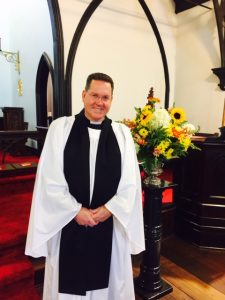
Michael Vollman, PhD, RN
After serving as a faculty member at MTSA for 16 years, Michael Vollman, PhD, RN, is retiring from teaching and is now embarking on a new journey. He has transitioned from his avocation as an ordained minister at Trinity Episcopal Church in Russellville, Ky., into full-time ministry.
Vollman started the ordination process in 2012 and was ordained in 2014, while he was teaching at MTSA. Fulfilling a lifelong dream since he was 9 years old, he now is focusing his time and talents entirely on his congregation as well as his role as the Ecumenical Officer for the Episcopal Diocese of Kentucky.
In addition, Vollman is returning to the classroom – except, this time, as a student. He is attending Bexley Seabury Seminary in Chicago to study Christian theology and ethics.
“I consider my time at MTSA as truly privileged existence,” Vollman said. “It was some of the finest and most enjoyable times I’ve ever had in teaching. I’m also proud to have taken part in developing the clinical doctoral program and mentoring approximately 30 doctoral students in that short period of time. The administration and faculty at MTSA have been so dedicated to making this program happen and doing it the right way. We were able to produce an excellent product, and I’m very proud of that.”
Regarding his wide influence on the many students he has taught over the years, Vollman responded with humility: “I see myself as a conduit, simply passing along everything good and valuable that was given to me by the teachers and mentors in my life, one of whom was a long-time MTSA faculty member, Larry Lancaster. That’s the trajectory in the academic world; at some point you were someone’s student, and the best of what you learn from them you pass along to others.”
Prior to joining the faculty at MTSA, Vollman served on the faculties at the Vanderbilt University School of Nursing, and the Georgetown University School of Nursing and Health Studies.
President Chris Hulin offered a heartfelt sendoff: “It has been an honor to have Dr. Vollman as a faculty member at MTSA for so many years. His leadership has helped shape who we are as an institution of higher learning. On behalf of everyone whose lives he has impacted at MTSA and beyond, I wish him the very best in his ministry. I know that God will continue to use his gifts of teaching to help many others.”
MTSA to Offer Service Opportunity this Fall
Anonymous donor to match funds
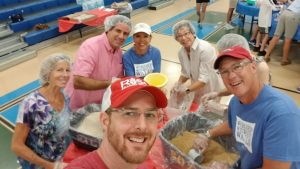
MTSA has announced a service opportunity to any and all alumni and friends wishing to help in the fight against hunger. The School will partner with Rise Against Hunger in November to assemble and distribute food packages to underserved communities around the world:
WHAT: Mission Against Hunger
WHEN: Tuesday, Nov. 26 | 1 p.m.
WHERE: P.T. Magan Hall, 312 Hospital Drive
HOW:
1) Participate on the day of by assembling food packages; and/or
2) Make a donation to support this effort
INFO: www.mtsa.edu/RiseAgainstHunger
“This is an opportunity for our alumni to join in service with current students to give to those in need, especially as we get close to the holiday season,” said MTSA President Chris Hulin. “Our goal is to package 25,000 meals and raise $4,000. I’m also thrilled to announce that an anonymous donor will match those funds for a possible grand total of $8,000 that will go directly to feeding the underserved.”
According to Rise Against Hunger, $5 covers the cost of 15 meals, and for $75, a child can be fed for a year. With contributions from MTSA’s anonymous donor, Hulin pointed out that those outcomes can be doubled—30 meals for $5, or two children fed for a year for $75.
Rise Against Hunger’s mission is to “end hunger in our lifetime by providing food and life-changing aid to the world’s most vulnerable and creating a global commitment to mobilize the necessary resources.” Its meal packaging volunteers produce millions of nutritious meals annually that are then distributed to partners in countries around the world.
Individuals or organizations who would like to participate, donate or sponsor this effort may visit www.mtsa.edu/RiseAgainstHunger for more information.
Vanderbilt University Medical Center Awards MTSA Student, Alumni
Vanderbilt University Medical Center has recognized several nurse anesthetists who are currently enrolled or have graduated from MTSA, honoring them for their exemplary service and professionalism. The awardees are:
- CRNA Instructor of the Year: Gale Rowe, MTSA Class of 2012
- CRNA “Junior” Clinical Excellence Award: Nathan Silva, MTSA Class of 2017
- CRNA “Senior” Clinical Excellence Award: Heather Frankenfield, MTSA Class of 2009
- SRNA of the Year Award: Charina Pelayo, current MTSA student, Class of 2019
“Vanderbilt has 175 nurse anesthetists across all our locations throughout Middle Tennessee, and these honorees have clearly gone above and beyond,” said Brent Dunworth, CRNA, DNP, MBA, APRN, NEA-BC, Director of Advance Practice in Vanderbilt’s Department of Anesthesiology, and winner of MTSA’s Nevin H. Downs, MD Leadership Award in 2018.
According to Dunworth, the awardees serve in many areas of care, and all have risen to the occasion when it comes to serving patients and being helpful to their colleagues. “The majority of our CRNAs are graduates of MTSA, and we’re always happy to partner with the School for established programs and for programs in the future,” he added.
About the Awards and Recipients
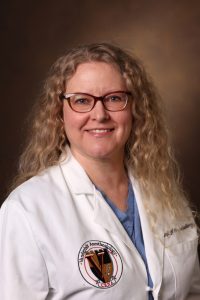 Gale Rowe – CRNA Instructor of the Year: Students gave Rowe endless commendations as a clinical instructor. She is described as positive, encouraging, and a calming presence in an otherwise stressful world. She is able to be direct without being harsh, and can focus easily on areas where students need additional assistance. She is a patient teacher and encourages independent thinking and success.
Gale Rowe – CRNA Instructor of the Year: Students gave Rowe endless commendations as a clinical instructor. She is described as positive, encouraging, and a calming presence in an otherwise stressful world. She is able to be direct without being harsh, and can focus easily on areas where students need additional assistance. She is a patient teacher and encourages independent thinking and success.
This award is chosen from the composite feedback from student nurse anesthetists who have rotated through Vanderbilt over the last year. The CRNA Instructor of the Year demonstrates excellence in education through teaching, demonstration, creativity, and professional role modeling.
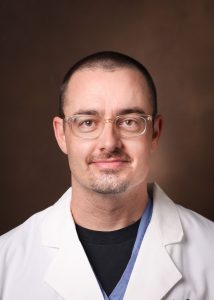 Nathan Silva – CRNA “Junior” Clinical Excellence Award: Silva sets an example as someone who is committed to his colleagues. He is always willing to lend a helping hand, and his calm, witty presence makes everyone around him feel at ease. He takes great care of his patients, is always willing to learn, and is such a positive mentor for SRNAs. He has been a great addition to our team.
Nathan Silva – CRNA “Junior” Clinical Excellence Award: Silva sets an example as someone who is committed to his colleagues. He is always willing to lend a helping hand, and his calm, witty presence makes everyone around him feel at ease. He takes great care of his patients, is always willing to learn, and is such a positive mentor for SRNAs. He has been a great addition to our team.
This award is presented to a CRNA who is in his or her first two years of practice who has demonstrated excellence in the clinical arena through knowledge, skill, and attitude. In short, this awardee is a real rising star!
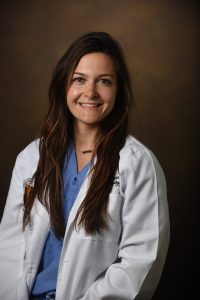 Heather Frankenfield – CRNA “Senior” Clinical Excellence Award: Frankenfield is “one of a kind.” She is clinically stellar and is a role model for her peers and students by always having a positive attitude and never complaining. She encourages scholarship, demonstrates scholarship often by presenting very complex topics, and is always looking for opportunities to professionally develop the CRNA staff. She has committed to be an example of a team player by helping in any area of VUMC that is necessary, even when it is out of her comfort zone.
Heather Frankenfield – CRNA “Senior” Clinical Excellence Award: Frankenfield is “one of a kind.” She is clinically stellar and is a role model for her peers and students by always having a positive attitude and never complaining. She encourages scholarship, demonstrates scholarship often by presenting very complex topics, and is always looking for opportunities to professionally develop the CRNA staff. She has committed to be an example of a team player by helping in any area of VUMC that is necessary, even when it is out of her comfort zone.
This award is presented to the CRNA who is beyond two years of practice and who continually demonstrates formidable clinical acumen through knowledge, skill, and attitude. This awardee is a role model to the entire department!
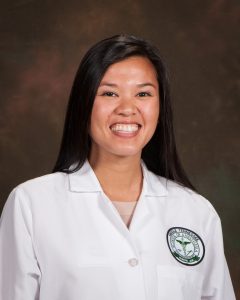 Charina Pelayo – SRNA of the Year Award: Pelayo has received accolades from every rotation that she has completed. She has demonstrated a great depth of knowledge of anesthesia principles and strong technical skills. She has been exceptionally professional, well-prepared for cases consistently, and has always sought out complex cases to take part in.
Charina Pelayo – SRNA of the Year Award: Pelayo has received accolades from every rotation that she has completed. She has demonstrated a great depth of knowledge of anesthesia principles and strong technical skills. She has been exceptionally professional, well-prepared for cases consistently, and has always sought out complex cases to take part in.
This award is bestowed upon a graduating SRNA who has demonstrated strong work ethic, academic success, and refined clinical ability.
Gentry Completes TICUA Executive Leadership Institute Program
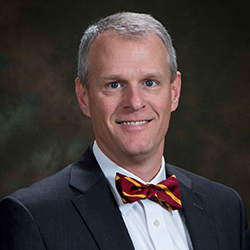
MTSA Program Administrator Rusty Gentry, DNAP, CRNA
In June, MTSA Program Administrator Rusty Gentry, DNAP, CRNA, graduated from the Tennessee Independent Colleges and Universities Association’s (TICUA) Executive Leadership Institute (ELI), an innovative leadership development program to prepare university leaders with the knowledge and skills they need to build healthy campuses and serve students.
The nine-month program is designed to strengthen campus leadership teams and prepare the next generation of leaders for college or university executive roles. ELI participants, known as Presnnell Fellows, are selected by their institution’s president to participate.
During the course of the year-long program, the ELI Pressnell Fellows gain training and insight on key issues related to leading a higher education institution today including, institutional governance, educational policy and politics, strategic planning, friend- and fund-raising, public relations, internal and external communications, enrollment management, academics and faculty relations, and financial management.
ASPM Fellowship Study Published in Korean Journal of Anesthesiology
A recent research study authored by MTSA faculty has been accepted for publication in the Korean Journal of Anesthesiology. The study, Retroclavicular Approach to the PECS (RAP) Block: A Novel Regional Technique for Breast Surgery, was submitted by Kelly Martin, MS, CRNA; Bill Johnson, DNAP, CRNA; and Rob Taylor, MD.
Johnson is director of the Acute Surgical Pain Management (ASPM) Fellowship, and Taylor is MTSA’s medical director. Martin is an adjunct faculty member of the Fellowship as well as clinical adjunct in the nurse anesthesia program at York College and full-time faculty member at Wellspan Health at York Hospital in Pennsylvania.
Johnson and Martin also presented the study at last year’s European Society of Regional Anaesthesia (ESRA) Congress in Dublin, Ireland.
The idea for the technique combined two blocks to be able to place a catheter in one of the planes where anesthetic is injected for the PECS block, extending the analgesia for several days. The PECS block is combined with a brachial plexus block. The new “combined” technique is called a Retroclavicular Approach to the PECS (RAP) block and it involves inserting the needle behind the clavicle, going underneath the clavicle and into the PECS plane rather than inserting the needle directly on the anterior part of the chest or on the front of the chest wall.
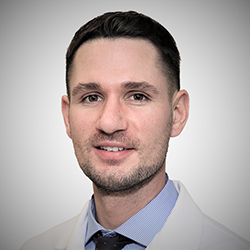
Kelly Martin, MS, CRNA
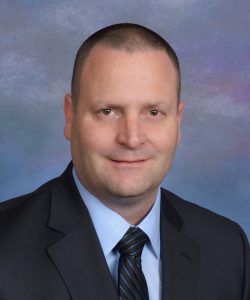
Bill Johnson, DNAP, CRNA
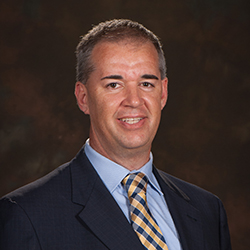
Rob Taylor, MD
3rd Annual Sporting Clay Tournament
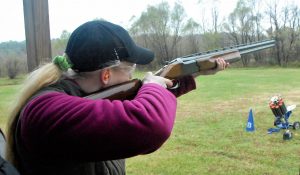
Friday, Nov. 8
Nashville Gun Club
8:30 a.m. – Registration
10:00 a.m. – Tournament Starts (all equipment provided)
Awards luncheon to follow (lunch included): Team awards for 1st, 2nd and 3rd place
Nashville Gun Club
Sporting Clay Complex
1100 County Hospital Rd.
Nashville, TN 37218
(Located off Briley Parkway, Bordeaux area)
Cost: $150 per person
MTSA’s popular Sporting Clay Tournament returns for its third year, allowing marksmen and novices alike to hit moving targets at multiple shooting stations.
Proceeds will help support the School’s opioid reduction initiative.
Team registration and sponsorship opportunities are available now by visiting www.mtsa.edu/sportingclay, or by calling (615) 732-7674.
MTSA Offers Regional Cadaveric Workshops in 2020
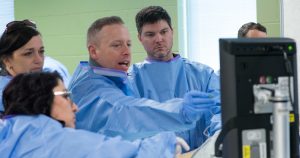
MTSA announced it will offer four Cadaveric Ultrasound-Guided Regional Anesthesia workshops for CRNAs in 2020:
- Basic Course – Feb. 23, 2020
- Basic Course – March 22, 2020
- Advanced Course – Aug. 2, 2020
- Advanced Course – Oct. 25, 2020
Registration is now open for CRNAs who want to participate in these hands-on training courses utilizing cadavers and “live” scanning models, state-of-the-art ultrasound technology, and a comprehensive approach to regional anesthesia techniques for surgery and acute pain management.
Participants receive the benefits of small-group “live” scanning and needling stations, low faculty-to-attendee ratios, and an individualized learning plan that suits the attendee’s needs in regional anesthesia. Information presented will be highly practical and immediately useful to the attendee’s daily clinical practice.
Registration is available at www.mtsa.edu/workshops. For more information contact Bill Johnson at (615) 732-7846 or bill.johnson@mtsa.edu.
Registration Closing Soon for 2020 Cohort of the Acute Surgical Pain Management Fellowship
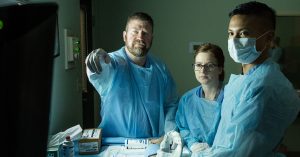
Deadline to apply: Nov. 1, 2019
Course begins: Jan. 6, 2020
The field of pain management is continually growing. As the baby boom generation ages, increasing numbers of patients will undergo surgery, and CRNAs will be responsible for managing these patients’ acute pain. The AANA/MTSA Acute Surgical Pain Management (ASPM) Fellowship equips CRNAs with the necessary knowledge and skill-sets to meet this growing demand.
From medical management approaches, such as multimodal therapies and opioid sparing strategies, to advanced interventional techniques, including continuous catheter utilization, CRNAs acquire the knowledge to treat these patients with confidence and skill.
The ASPM Fellowship consists of a classroom component offered via distance education (didactic education) and a clinical component (proctored hands-on clinical experience offered through one or more clinical sites). Fellows learn innovative techniques including multimodal and interventional therapies to manage acute surgical pain, while developing business management proficiency.
More information and registration is available at www.mtsa.edu/fellowship.
You're invited to Tots and Dogs
An event for MTSA alumni and student alumni-in-residence members and families
 Join your fellow MTSA alum at Saunders Ferry Park in Hendersonville, Tenn., on Sunday, Nov. 10, from noon to 3 p.m. for Tots and Dogs!
Join your fellow MTSA alum at Saunders Ferry Park in Hendersonville, Tenn., on Sunday, Nov. 10, from noon to 3 p.m. for Tots and Dogs!
Beef franks and veggie hot dogs will be served alongside Alumni President Rod Schwindt’s famous tater tots. All MTSA alumni and MTSA Alumni-in-Residence student members are invited. Families and kids are welcome as well.
Attendees are asked to RSVP and to bring a side: chips, salads, or dessert. Water and tea will be provided. If you have a yard/outdoor game, you are encouraged to bring it. Some outdoor activities will include corn hole and bocce lawn bowling. Come for a relaxed afternoon of food, fellowship, and fun. Families are invited. Kids are welcomed.
For more information or to RSVP, visit www.mtsa.edu/events.
Class of 2019 Graduation Ceremony
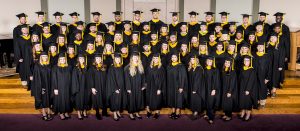
MTSA graduation exercises for the Class of 2019 are scheduled for Friday, Nov. 15, at the Madison Campus Seventh-day Adventist Church. The ceremony recognizing this year’s graduates will begin at 10 a.m.
The event will be followed by an open house on the School’s campus located adjacent to the church. Refreshments will be served.
For more information, visit www.mtsa.edu/graduation2019.
Class of 2021 recognized at White Coat Ceremony
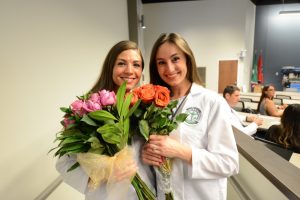
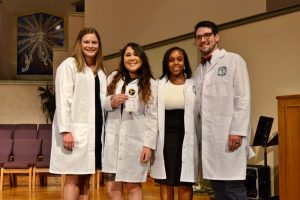
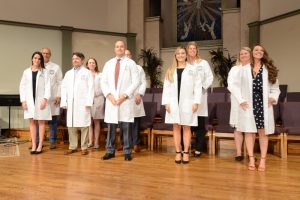

The ceremony celebrating DNAP students’ progression to clinical rotations was held on Thursday, Aug. 15, at the Madison Campus Seventh-day Adventist Church and streamed on Facebook Live.
Video is available at www.facebook.com/MTSAnesthesia.
Administrative Changes Announced
MTSA President Chris Hulin, DNP, MBA, CRNA, announced two administrative changes to better reflect the direction and progression of MTSA.
Maria Overstreet, PhD, RN, is the newly appointed Vice President for Academics and Institutional Effectiveness. She continues to have administrative oversight of student services, Title IX, and benchmarking. The dean title has been retired and reflects MTSA’s growth and strategic planning for its future.
Bill Johnson, DNAP, CRNA, is the newly appointed Director of the DNAP Completion Program. He will maintain his role as Director of the Acute Surgical Pain Management Fellowship. This change will bring coordination and a foundation for continued program development in these areas.
From the Archives: Class of 1971
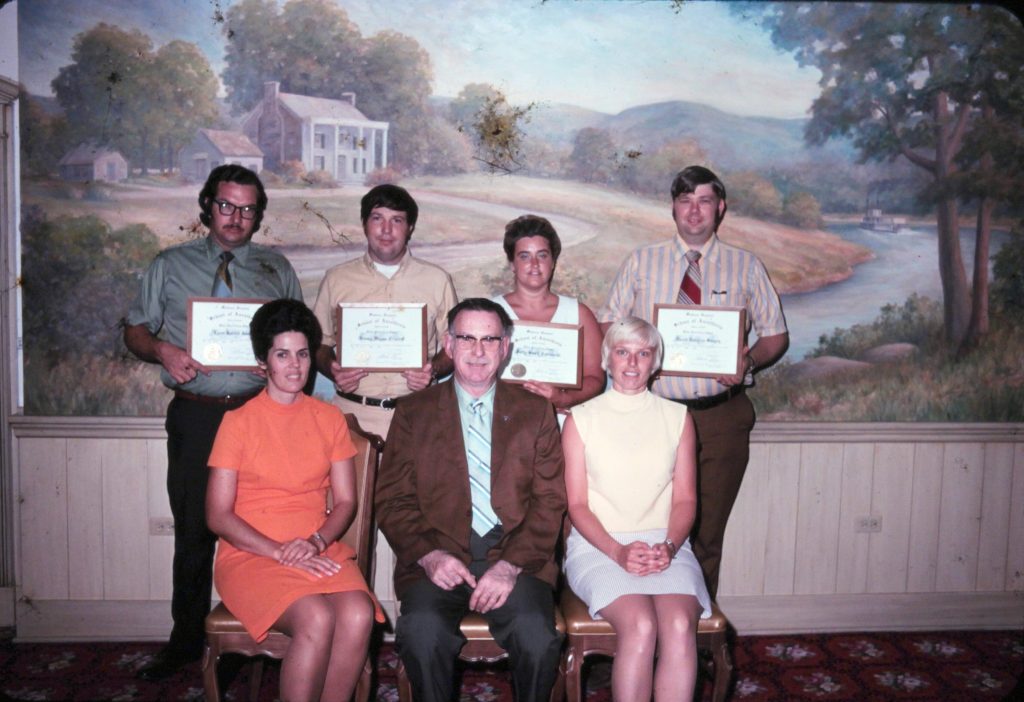
MTSA Founder Bernard V. Bowen (seated center) with two instructors beside him with members from the graduating class of 1971. (l to r) Lynn Jones, Jim Crosby, Patty Cornwell, and David Singer. We welcome your help in identifying the two persons seated next to Mr. Bowen.


